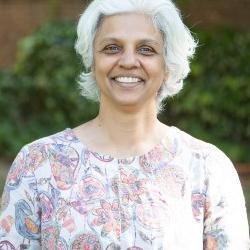Biography
Dr. Shailaja Fennell is Reader in Regional Transformation and Economic Security at the Department of Land Economy. She is a co-I on TIGR2ESS, a research programme to study how to improve crop productivity and water use, identify appropriate crops and farming practices for sustainable rural development, with funding of £7.8 million from the Global Challenges Fund of RCUK. She is also a co-I on MillNeti, a sister research programme (2019-2021) that is focussed on how to improve iron nutrition status of people living in Ethiopia and The Gambia by assessing the bioavailability of iron from biofortified millet. Her work package focuses on the use quantitative and qualitative surveys to understand how millets are currently grown, processed, cooked and consumed in focus villages in The Gambia and Ethiopia.
Dr. Fennell is the PI on an ASEAN funded project (2019-2021), and leading a core team responsible for designing the framework, commissioning the experts and compiling the latest research to deliver the first ASEAN Development Outlook that focuses on policies to ensure inclusion and sustainability in South-East Asia.
She was awarded the UGC-UKIERI grant for a collaborative research initiative, in partnership with Anglia Ruskin University, and the Indian partners were the Indian Institute of Technology-Madras and University of Punjab, Chandigarh for 2014-16. The project focussed on understanding how bottlenecks that limit Internet access for rural agricultural production and community-based tourism can be removed, using the Portolan application and android mobile phones, to collect upstream data and an innovative survey instrument to collect downstream data.
Dr Fennell was an international team leader on public-private partnerships in education project within the DfID-funded Cambridge-based consortium on educational outcomes for the poor (RECOUP) that was worked with partners in Ghana, India, Kenya and Pakistan, from 2005-2010.
She has been a consultant on inequality and rural development with Oxfam GB (2014-15), on evidence-based policy with the World Bank (2013-15), and was earlier the social science expert on agriculture and gender and a member of the five-person team that authored the European Report on Development on Fragility in Africa, 2008-09.
Research
Over the last two years, Dr Fennell, together with researchers from Anglia Ruskin University, Indian Institute of Technology, Madras and the University of Punjab, have been looking at the bottlenecks that limit rural access to the internet and the mobile-based services that could provide educational and employment opportunities to young people.
The research team has developed an innovative mobile phone app, Portolan, designed by Department of Computer Science at the University of Pisa, that tracks and evaluates the benefits of improved connectivity, in terms of its costs, reliability and quality. The team, funded by a UGC-UKIERI grant, is are using this 'app' in Tamil Nadu and in the northern state of Punjab, both of which have prospered in terms of agricultural productivity increases for the past four decades.
The project provides the opportunity to analyse how rural communities that have improved their economic status translate their agricultural success into the educational improvement and employment opportunities for their youth,The aim of the project is to understand how the reduction in communication costs and increase in connectivity enabled by mobile phones can be best used to promote economic development in rural areas.
Please find previous interviews with Shailaja here and here.

